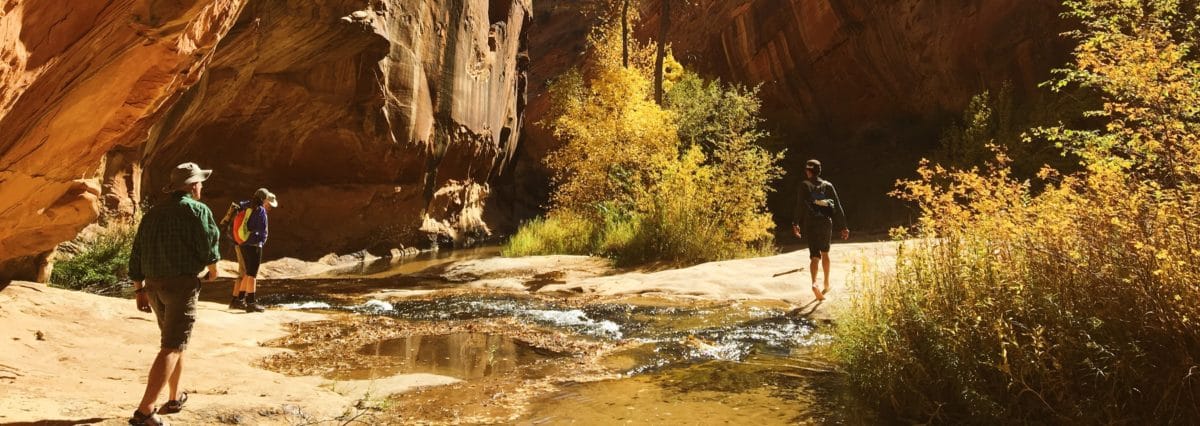[vc_row][vc_column][vc_column_text]This last Monday, I braved the cold and joined with thousands of Utahns to protest President Trump’s recent decision to slash millions of acres from our national monuments. It was inspiring to be part of such an impassioned crowd, albeit a little depressing as I realized our shouting and protesting would not influence Senator Hatch or President Trump.
[/vc_column_text][/vc_column][/vc_row][vc_row][vc_column][vc_single_image image=”10957″ img_size=”full”][/vc_column][/vc_row][vc_row][vc_column][vc_column_text]Reading the news and checking social media in the days following this decision shows there has been no shortage of commentary about the topic of protection of public lands. While the arguments are divisive and polarized, they all have one thing in common: they focus on the human benefit from the land.
Whether it’s economic benefit from extraction, physical fulfillment from outdoor recreation, or spiritual healing from sacred grounds, all arguments for both protecting or not protecting the land focus on human benefit. This focus is only natural, of course, as we are justifiably self-interested creatures. However, our inability as a culture to view land, animals, and ecosystems as having inherent value results in perpetual contention regarding environmental protection.
This ongoing conflict between environmentalists and the current administration is palpable. President Trump’s administration and the Republican-controlled Congress continue to steamroll environmental regulations, loudly waving a number on a price tag as their main argument. They claim businesses earn more money when they don’t have to follow these pesky environmental regulations and incomes in rural economies will astronomically skyrocket when land is used for extraction. In short, it feels economic gain is the only motivating factor for the administration, and those currently in power fail to consider the intrinsic worth of the animals and ecosystems of the land. It is painfully ironic that the decidedly pro-life party struggles to extend that same respect for life towards all living creatures. [/vc_column_text][/vc_column][/vc_row][vc_row][vc_column][vc_single_image image=”10958″ img_size=”full” add_caption=”yes”][/vc_column][/vc_row][vc_row][vc_column][vc_column_text]Unfortunately, their economic arguments are persuasive, as we all use natural resources and money does indeed make the world go round. Even the zero-waste, granola environmentalists use natural resources and every living thing consumes something to survive. However, while this consumption is natural and necessary, waste is not. We cannot let the allure of economic growth trick us into growing for growth’s sake and consuming for consumption’s sake because doing so is unsustainable and will lead to the complete exploitation of the environment.
If we really respected the land and felt equal to it, rather than superior, then we would be much smarter about the way we use the land and the resources. We would be conscious of our waste, which would in turn limit our consumption as well as the need to drill oil, mine coal, and perform any other type of extraction.
If we accepted the unchanging and inherent value of land, greedy consumption wouldn’t control businesses and there would never have been a question on whether we should protect or not protect our national monuments. If Republican legislators and the President understood the importance of this earth, Grand Staircase-Escalante National Monument wouldn’t have been conveniently cut up for coal development, Bears Ears would still exist with the original boundaries, and thousands of Utahns wouldn’t have had to protest in the cold to protect these incredibly valuable lands.[/vc_column_text][/vc_column][/vc_row][vc_row][vc_column][vc_single_image image=”10962″ img_size=”full”][/vc_column][/vc_row][vc_row][vc_column][vc_separator color=”orange”][/vc_column][/vc_row][vc_row][vc_column][vc_column_text]Laura Boyer is the policy and advocacy fellow at the Alliance for a Better Utah. She has a deep love for the wild places in Utah and hopes to see them remain protected. [/vc_column_text][/vc_column][/vc_row]

